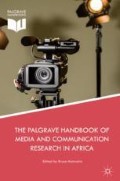Abstract
One Sunday at around noon one day in 2014, Maman Thérèse (a fictive name) arrived in the compound where I live when I carry out fieldwork. She often dropped by to greet my host mother. That day, I noticed that she was carrying a DVD, which, as I learned, she had received from one of her girlfriends at church. She wanted to hear my host brother’s opinion about the content. This married woman with four children is in her late thirties and works as a nanny in the school that one of her daughters attends. Since I first met her in 2003, I have always known her to visit the Church of the Awakening (a type of Pentecostal-charismatic church). With a smile that seemed to beg for apologies, Maman Thérèse told me that the DVD contained a clip in which some of Fally Ipupa’s music video clips—he is one of Congo’s most successful rumba musicians—are interpreted as “genre Illuminati,” a secret society in the imagination of Kinois (inhabitants of Kinshasa) intimately connected with the world of Freemasonry and Rosicrucianism. I had already noticed various posts on my Congolese friends’ Facebook walls about the possible connections between Congolese musicians and this secret society. Now I was shown that these accusations also circulate on other media carriers and among people who do not remediate such messages on their Facebook accounts.
Access this chapter
Tax calculation will be finalised at checkout
Purchases are for personal use only
Notes
- 1.
The anonymity—whether deliberate or unintended—of popular culture producers is not “new” in the study of African popular culture; see Newell (2013) on the use of pseudonyms in colonial West African newspapers.
References
Barber, K. (1987). Popular arts in Africa. African Studies Review, 30(3), 1–78.
Barber, K. (2007). The anthropology of texts, persons and publics: Oral and written cultures in Africa and beyond (New Departures in Anthropology, No. 5). Cambridge: Cambridge University Press.
Deger, J. (2016). Thick photography. Journal of Material Culture, 21(1), 111–132. https://doi.org/10.1177/1359183515623312?journalCode=mcua
Eickelman, D. F. (1999). Communication and control in the Middle East: Publication and its discontents. In D. F. Eickelman & J. W. Anderson (Eds.), New media in the Muslim world. The emerging public sphere (pp. 33–44). Bloomington: Indiana University Press.
Englund, H. (2011). Human rights and African airwaves. Mediating equality on the Chichewa radio. Bloomington: Indiana University Press.
Fabian, J. (2008). Ethnography as commentary. Writing from the virtual archive. Durham, NC and London: Duke University Press.
Graetz, T. (2011). Introduction. Journal of African Media Studies—special issue Contemporary African mediascapes: New actors, genres and communication space, 3(2), 151–160. https://doi.org/10.1386/jams.3.2.151_7
Jedlowski, A., Oloko, P., Roeschenthaler, U., & Wane, I. (2015). Across media: Mobility and transformation of cultural materials in the digital age. Journal of African Media Studies, 7(1), 3–9. https://doi.org/10.1386/jams.7.1.3_2
Lomborg, S. (2014). Social media, social genres: Making sense of the ordinary. New York: Routledge.
Meyer, B. (2004). “Praise the Lord”: Popular cinema and Pentecostalite style in Ghana’s new public sphere. American Ethnologist, 31(1), 92–110. https://doi.org/10.1525/ae.2004.31.1.92/full
Meyer, B. (2006). Religious revelation, secrecy and the limits of visual representation. Anthropological Theory, 6(4), 431–453. https://doi.org/10.1177/1463499606071596
Meyer, B. (2010). Aesthetics of persuasion. Global Christianity and Pentecostalism’s sensational forms. South Atlantic Quarterly., Special issue on Global Christianity, Global Critique, 9, 741–763.
Meyer, B. (2015). Sensational movies: Video, vision, and Christianity in Ghana. Berkeley: California University Press.
Newell, S. (2013). The power to name: A history of anonymity in colonial West Africa. Athens: Ohio University Press.
Pype, K. (2011). Visual media and political communication: Reporting about suffering in Kinshasa. Journal of Modern African Studies, 49(4), 625–645.
Pype, K. (2012). The making of the Pentecostal melodrama. Religion, media, and gender in Kinshasa. New York, NY and Oxford: Berghahn Books.
Pype, K. (2013). Scripting Kinshasa’s teleserials reflections on authorship, creativity and ownership. In J. Gray & D. Johnson (Eds.), A companion to media authorship., Chap. 27 (pp. 525–543). Malden, MA: Wiley.
Pype, K. (2015a). The liveliness of Pentecostals/charismatic popular culture in Africa. In M. Lindhardt (Ed.), Pentecostalism in Africa. Presence and impact of pneumatic Christianity in postcolonial societies (pp. 345–378). Leiden, The Netherlands: Brill Publishers.
Pype, K. (2015b). Remediations of Congolese urban dance music in Kinshasa. Journal of African Media Studies, 7(1), 25–36. https://doi.org/10.1386/jams.7.1.25_1
White, B. W. (2004). The elusive lupemba: Rumours about fame and (mis)fortune in Kinshasa. In T. Trefon (Ed.), Reinventing order in the Congo: How people respond to state failure in Kinshasa (pp. 174–191). Kampala, Uganda and London: Fountain and Zed Books.
Acknowledgements The data for this chapter have been collected during field visits in Kinshasa, financed by a Marie Curie Postdoctoral Fellowship (PIOF-GA-2009-252331) and an ERC-Runner Up Budget (FWO G.A005.14N) and supported by funding from the Research Council of Norway (FRIPRO program, “New Media Practices in a Changing Africa”). I am grateful to all institutions for financing these trips. In addition, my gratitude goes to the research participants and interlocutors who have helped me to make sense of these digital texts. Some initial ideas of this chapter have been presented at the “Religion as Creativity” symposium organized by James Bielo and John Cinnamon 2–3 October 2015, Miami University (Oxford, Ohio), where fellow participants’ comments have been very inspiring. Isabelle de Rezende has done the language editing.
Author information
Authors and Affiliations
Editor information
Editors and Affiliations
Rights and permissions
Copyright information
© 2018 The Author(s)
About this chapter
Cite this chapter
Pype, K. (2018). “The Devil is in the Rumba Text.” Commenting on Digital Depth. In: Mutsvairo, B. (eds) The Palgrave Handbook of Media and Communication Research in Africa. Palgrave Macmillan, Cham. https://doi.org/10.1007/978-3-319-70443-2_14
Download citation
DOI: https://doi.org/10.1007/978-3-319-70443-2_14
Published:
Publisher Name: Palgrave Macmillan, Cham
Print ISBN: 978-3-319-70442-5
Online ISBN: 978-3-319-70443-2
eBook Packages: Literature, Cultural and Media StudiesLiterature, Cultural and Media Studies (R0)

